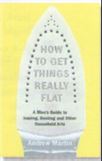FCE topic about important quality for parents
تاپیک اف سی ای درباره ی ویژگی های مهم برای والدین

Reading and Use of English
Part 2
Open Cloze
1 Read the quotations about housework. Which is your favourite? Why?
Dottie Archibald
My husband and I have figured out a really good system about the housework: neither one of us does it.
Evan Esar
Housework is what a woman does that nobody notices unless she hasn't done it.
Joan Rivers
I hate housework! You make the beds, you do the dishes - and six months later you have to start all over again.
Marcelene Cox
Housekeeping is like being caught in a revolving door.
2 Who does most of the housework in your family? Which household chores do vou do? How do you feel about doing them? Why?

3 Look at the cover of the book How to get things really flat. What sort of advice do you think it includes? Why do you think the author calls it A Man's Guide?
4 Read the internet review of the book, ignoring the gaps, then answer these questions. Would you be interested in readins this book? Why?Why not?
How to get things really flat by Andrew Martin
This was by(0) FAR the best present I received last Christmas. It's an informative and amusingly written book, which is (1) funny that it had me laughing out loud (2) a number of occasions. Andrew Martin has managed(3)make the subject of housework entertaining, combining useful information and tips with recollections from his childhood and hilarious scenes from daily family life. (4) it's labelled 'a man's guide', it's intended for any 'person who does not know, or care, (5) day the dustbin men comer or where the bathroom cleaner is kept'.
The title of the book is a reference to ironing. Martin reassures us that this is (6) at all difficult, and he describes the correct order (7) which we should iron the various parts of a shirt. We also learn 'how to load a dishwasher without causing comment', how to vacuum stairs, and why a feather duster (8) from ostrich feathers is better than a synthetic one. An interesting read - highly recommended.
5 Read the text again and for questions 1-8, think of the word which best fits each gap. Use only one word in each gap. There is an example at the beginning (0). Write your answers IN CAPITAL LETTERS.
How to go about it
- Look at the words both before and after the gap, before you decide what the missing word is.
For gaps 1-3, as for the example (0), key words have been underlined to help you make your decisions.
No words are underlined in the First examination.
- Sometimes you will only be able to make the right decision by reading the whole sentence.
For gap 4, read the whole sentence before deciding which linker to use.
Lisining 1
Part 4
Multiple choice 1.30
1 Do you think teenagers should be expected to help with the housework?
WhyAilhy not?
2 You will hear an intewiew with a woman called Deborah chilton talking about teenagers and housework. For questions 1-7, choose the best answer (A, B, or C).
D: Well, as you say, it's not easy, but if we're aware of what we're trying to achieve and why, then the battle is half won. Getting teenagers to contribute to housework has so many benefits. It's an ideal way of teaching them what it means to belong to a family and a community. They also learn to take on more responsibility as they approach adulthood, and they pick up some useful skills on the way, too. Knowing all this gives parents the strength they need to see their goals through.
I: Right. And at what age should teenagers begin helping out with the housework?
D: Long before they reach adolescence. Teenagers are naturally resistant to being told what to do, and suddenly asking them at fourteen or fifteen to take on chores when they've never done anything to help before - well, let's just say it doesn't meet with a very positive reaction. Parents often fail to take advantage of the fact that young children are quite happy to make their bed, tidy their room, lay the table or wash the-dishes. So get them started early and you'll find it easier later on.
I: And what sort of things can teenagers do?
D: Cleaning, washing, ironing. Anything, really. Planning and cooking a meal each week is excellent training, and teaches teenagers how much time and effort goes into putting food on the table. Whatever they do, just be sure to explain to them carefully how to do it first. My son once almost tried to wash the toaster in the sink while it was still plugged in!
I: Oh dear!
D: Yes. Teenagers will make mistakes, and that's part of the learning process. But it's best to try and avoid them before they actually happen.
I: Indeed. And what if your teenage son or daughter decides not to do a chore? What then?
D: Well, it's a good idea to make their contribution something that's important to them as well. That way, if it's not done, they're the ones to suffer. So for example, if they don't do the washing, they won't have clean clothes for a party; if they don't do the shopping, they can't eat. They'll get the idea eventually.
I: So you wouldn't consider handing out punishments?
D: Only as a last resort. They tend to cause bad feeling and resentment. If things don't get better, sit down together and remind them of their duty to other family members and the need to work as a team. And for the same reasons, don't give financial rewards for completing chores. Housework is an obligation, rather than a choice, and no one gets paid for doing it.
Hmm. If only we did! So, housework has to be done, and that's it.
D: Yes, but there's still room for some negotiation. Understandably, teenagers like to feel they have at least some say in the matter. So whilst the chore itself is not negotiable, when it is carried out might be. In fact, rather than say to your teenage child 'could you load the dishwasher?' - to which they could answer 'no' - ask them instead 'would you like to load the dishwasher before or after the film?' That way there's an element of choice, and the job gets done sooner or later.
I: Very clever. I like that.
D: Yes. And I would just like to say, that although domestic duties can be a pain, they can also be a welcome distraction. Teenagers generally have a lot on their minds, whether it's schoolwork, friendship problems or boyfriend/girlfriend issues. Vacuuming the carpet, cutting the grass or cleaning the car provides an alternative focus and helps take a teenager's mind off his or her daily concerns.
I: Certainly. And that's a very positive note to finish on. Deborah, thank you for coming in ...
1 Deborah says it is important for parents to understand
2 According to Deborah, what is the mistake thatmany parents make?
3 De-borah says that parents should give teenagers
4 According to Deborah, what should parents do if a teenager fails to do a chore?
5 What does Deborah recommend parents should do if the situation does not improve?
6 Which aspecr of a chore does Deborah feel a teenager could decide?
7 Deborah says a positive feature of household chores is that
3 Do you agrce that teenagers should not be paid fordoing household chores?
Why/Why not?
Speaking2
Part 3
Collaborative task
When a mixed group of teenagers and adults was asked what they thought were the qualities of a good parent, they came up with the following list. Talk to each other about how important it is for a parent to have each of these qualities.
How Important is It for a parent to have these qualities?
A sense of humour
Patience
sense of fairness
The ability to listen
Strictness
2 Now decide which two qualities are the most important for a parent to have.
Don't forget
Interact with your partner: ask them questions, respond to their answers and give your own opinions.
In task 2 you do not have to agree with your partner.
Useful language
It's important/essential for a parent to be patient otherwise ...
If parents are not strict enough/too strict with their children, then ...
Parents need to show patience/authority/a sense of humour, because ...
A good parent is one who listens to their children's problems ... .
Parents should always be (firm but) fair towards their children ....... .
Look again at the Useful language box on page 36.


